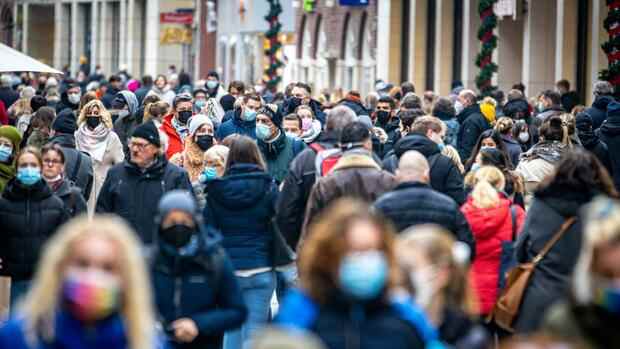Consumer economic expectations plummeted.
(Photo: imago images / Rüdiger Wölk)
Dusseldorf The fourth corona wave caught Germany on the wrong foot. The country seems unprepared and consumers are unsettled. This is signaled by the HDE consumption barometer for December. The mood plummeted even more than in December of the previous year. Only at the beginning of the pandemic in spring 2020 were there even more severe slumps.
The HDE barometer now stands at 95.36 points, almost three points lower than in the previous month. The leading indicator is calculated monthly by the Handelsblatt Research Institute (HRI) for the trade association HDE. It is based on a representative consumer survey.
Almost all components of the index are pointing down, and consumer expectations for the economy plummeted. In addition, consumers are increasingly concerned about rising prices.
The consumers’ fear of inflation reached an all-time high. The consistently bad economic news has reached consumers and is likely to be reflected in private consumption in the coming weeks.
Top jobs of the day
Find the best jobs now and
be notified by email.
In fact, the HDE barometer is more likely to sign the mood slump, as the measures adopted last Thursday to contain the pandemic have not yet been included in the survey.
Effects of the corona crisis
The old and new federal governments had agreed on a de facto lockdown for unvaccinated people, imposed contact restrictions and restricted major events. Previously, the federal states and municipalities had already imposed different regional measures, such as canceled Christmas markets.
The new corona wave has turned the predictions of most economic experts into obsolete. In October, the joint forecast of the leading economic research institutes had forecast 0.5 percent growth for the current fourth quarter and 1.3 percent growth for the first quarter of the new year – the German economy should now consider itself lucky if the economy does not shrink in the winter half-year. First economists are even warning of another recession.
The head of the Federal Employment Agency (BA) Detlef Scheele was unusually clear: “We are assuming that we are facing a really difficult winter” – even though the seasonally adjusted unemployment fell again noticeably in November.
Above all, the hospitality and retail sectors have already registered short-time work for more employees, especially in Saxony and Thuringia as well as in parts of Baden-Württemberg and Bavaria, said Scheele.
A survey by the Ifo Institute confirms that the number of short-time workers in November is likely to have risen again for the first time since February, albeit only slightly from around 10,000 to 608,000. In the auto industry, according to Ifo, twelve percent of employees currently work briefly.
Losses due to the new regulation
In the retail sector, short-time working was still negligible at one percent in November – but that could change quickly in light of the latest Corona resolutions.
In the future, retailers will have to control the 2G rules, and those who have not been vaccinated will have to be turned away. Only shops for daily needs are excluded from the tightening. “It is incomprehensible that politicians are now introducing 2G in retail despite functioning hygiene concepts and the mask requirement. This means that, for purely symbolic reasons, many retail companies are massively restricted in their peak sales period, ”said HDE Managing Director Stefan Genth.
Many affected shops are threatened with significant sales losses of up to 50 percent as a result of the new regulation. The queues in front of the controls at the shop doors are likely to put many customers off. Substantial sales shares, especially in the all-important Christmas business, are likely to shift to the online area.
According to the latest data, retail sales had already fallen surprisingly slightly in October. The only big winner this year is likely to be the online and mail order business.
In the future, retailers will have to control the 2G rules, and those who have not been vaccinated will have to be turned away.
(Photo: imago images / Hanno Bode)
While in the first ten months of this year sales in retail sales in sales rooms shrank by 1.9 percent in real terms, Internet sales rose by 16.1 percent – the concerns of stationary retailers are by no means out of thin air. So it is possible that 2021 will be another record year for retail as a whole, while at the same time the dying of the inner cities continued unabated.
More: Inflation in the euro area rose much more sharply than expected in November to almost five percent
